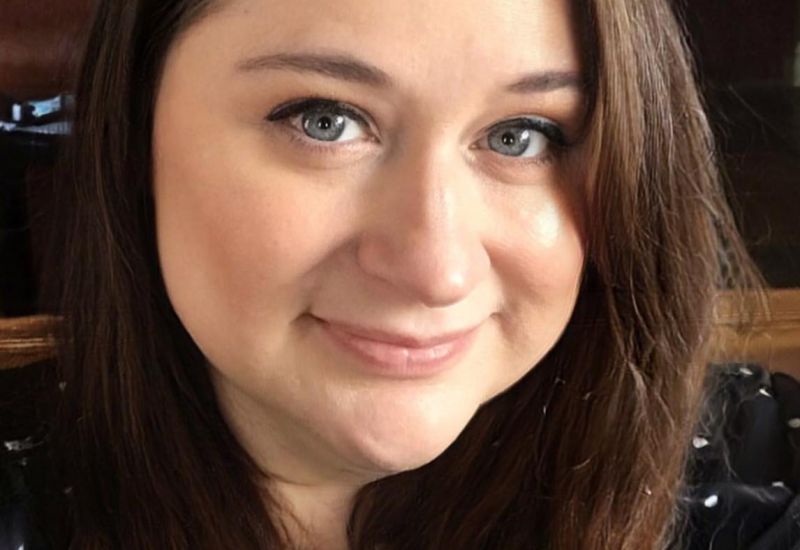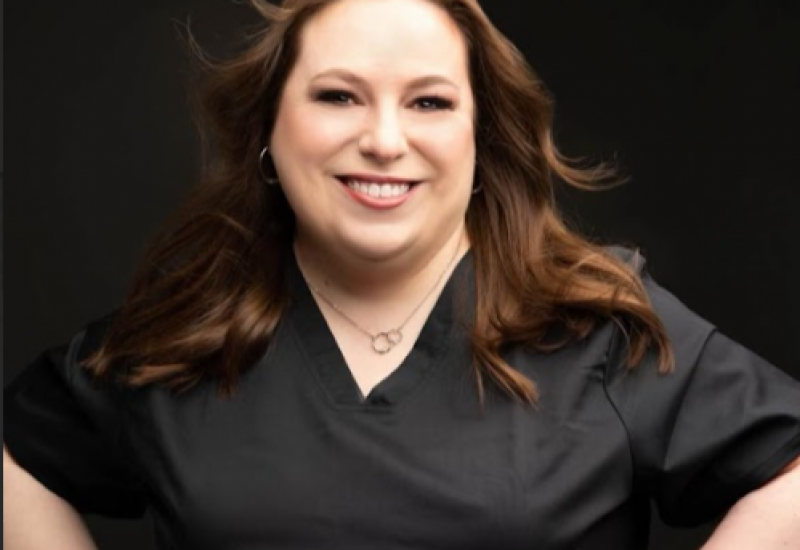Amanda Bonagura
In December 2018 I had a miscarriage that caused an infection. My obstetrician prescribed Augmentin to control the infection, but my condition worsened before I was able to take more than one tablet. I was sent to the emergency department (ED) for intravenous antibiotics and a dilation curettage procedure (D & C) to clear out the infection. Though I initially felt better after the D & C, I was still weak and had diarrhea while in the hospital. I was very thankful that I brought up my concern over how I felt with the obstetrician who performed the surgery because she told me that if diarrhea continued, I should come back to the hospital to be checked for C. diff. I continued to take oral Augmentin after discharge and felt that my health was slowly improving.
About two weeks later, I was still having diarrhea and now abdominal cramps. I was feeling light-headed and weak, but I had to pull myself together to get my oldest son to an interview for a prospective high school. We prayed the whole way to the high school, I bought a Gatorade in the vending machine, we prayed the whole way home, and then I rested in bed until my husband finished work. Up until this point in my life, I had been very fortunate to not have a health crisis. I did not have a primary care physician and I was uncertain whom to call about how I felt. I wound up calling the number for the obstetrician who performed the D & C and the doctor on call recommended I go to the ED.
It was a very busy Saturday night and I tried to inform the triage nurse that I was concerned that I had C. diff, especially since I needed to use the restroom in the waiting room a few times. Unfortunately, the triage nurse was disinterested. I eventually made it to a room, gave my stool sample, and received intravenous fluids. My husband and I knew the stool sample was positive before the doctor said anything because, for the first time, he dressed in full protective gear. The doctor gave me an initial dose of vancomycin in the hospital and ordered oral vancomycin for us to pick up the next day at the pharmacy.
After a few days of the vancomycin, I felt as if I were having an allergic reaction. I was very light-headed, I had a numb face, jaw stiffness, and tingling in my fingers and toes. Without a regular doctor to call, I went to an urgent care clinic and was told to stop the oral vancomycin. I was extremely nervous to stop the vancomycin, so I called my regular obstetrician out of desperation. Though I did not know it at the time, my obstetrician’s twin brother is an infectious disease doctor. She called him to ask what I should do. He said that in his clinical experience, not one patient ever had an allergic reaction to oral vancomycin. He urged me to keep taking the vancomycin no matter what. I also checked in with a good friend who is also an infectious disease doctor and he had the same experience with oral vancomycin. Confident, I kept taking the oral vancomycin and resolved to find a primary care doctor who could help me sort out the strange body reactions I was having.
Finding a primary care doctor is tough, especially during an illness! I made several calls, broke down in tears, and finally a secretary took pity on me and scheduled me to see the doctor for whom she worked right away. The doctor explained to me that the reactions I was having that seemed like allergic reactions were actually a result of the dying C. diff bacteria releasing toxins into the body. I was extremely relieved to learn that the weird feelings I was experiencing were “normal” and even the result of an enemy being vanquished, however, I knew I had to find a way to get back to feeling better. I no longer felt comfortable to drive, and I kept having to drink Gatorade to prevent panic attacks and to stay in the right frame of mind. Realizing that C. diff was not going away like strep throat, I resolved to educate myself and find a way to get better.
My search for answers about C. diff led me to the Peggy Lillis Foundation website. Fortunately, I quickly discovered that I was cleaning my house incorrectly. I got rid of the ammonia-based Clorox wipes that are ubiquitous at the stores and purchased bleach-based medical-grade Clorox wipes from Amazon. My mom, who traveled from West Virginia to help as soon as she found out I had C. diff, joined me on a 30-degree day in opening up all of the windows and bleaching the house. We bleached everything, we re-washed laundry so that we could bleach it, and then we bleached some more. I still keep a box of gloves in each bathroom and a container of bleach wipes for easy toilet cleaning. I also bought a UV cleaner called “phone soap” so that we could clean our phones and various small commonly used household objects. My whole family learned to do the “Hail Mary Hand Wash” too, which entails lathering hands as long as it takes to pray a Hail Mary, washing the suds away, and then turning off the water with the back of the wrist. I can’t say that my kids are good at that hand wash—it is exhausting to wash properly—but we keep encouraging good habits.
Three days after finishing my first round of vancomycin, my diarrhea came back. I called my primary care physician and he prescribed a stronger dose of oral vancomycin. The “allergic reaction” feelings returned after a few days of vancomycin. I had brain fog and headaches in addition to feeling light-headed and panicky. At this point, I decided to start keeping a food/medicine/symptom journal every day. Nothing seemed to be digesting properly and I felt weak from not getting proper nutrients. I poured over the written testimonies on Peggy Lillis, including Angela Kelly’s story (she used to have a fabulous blog called “Gutsy Mother”), bought a few e-books on Amazon, and a physical book called “Clostridium difficile: A Patient’s Guide” by Christopher O’Neal, Ph.D. and Raf Rizk, M.D. I also took the step of meeting with a GI doctor (a wonderfully compassionate doctor named Dr. Betsy Pathickal) to establish a relationship in case the C. diff returned after the second round of vancomycin.
One of the stories I read on the Peggy Lillis website described the challenges of figuring out what to eat. The woman described how sick she kept getting after eating food she used to be able to tolerate. Her testimonial very much spoke to me since I was wondering why the BRAT (bananas, rice, applesauce, toast) diet, usually prescribed for diarrhea, chicken noodle soup (the universal illness remedy), and gut-friendly foods like yogurt and kefir weren’t leading to recovery. Instead, I felt much worse. Thankfully, I also discovered in my reading that C. diff can cause temporary wheat and lactose intolerance. No wonder why typical diarrhea and sickness remedies filled with wheat and cow milk-based products were making me feel sicker.
One part of the C. diff survivor’s recovery story that intrigued me was the FODMAP diet. I had never heard of FODMAPs, but I was very interested in trying to discover a way to break the cycle of diarrhea, bloating, headaches, and brain fog. A FODMAP diet is a temporary elimination diet that seeks to isolate different carbohydrates that can cause gastrointestinal problems. I used a website called Diet v. Disease to guide me through the FODMAP diet process. I also use an app from Monash University in Australia that shows the FODMAPs contained in various foods and their quantities, which is indispensable while food shopping. The FODMAP diet made a huge difference in how I felt. I am certain I had undiagnosed irritable bowel syndrome for years before developing C. diff, and so, for me, the FODMAP diet helped me zero in on some surprising food groups that really bothered me. In addition to the FODMAP diet, I took the maximum dose of Florastor every day (two in the morning, two at night), drank a vegan nutrition shake called Orgain to replenish my vitamins, ate plant-based yogurt (Silk almond milk) three times a day, and added miso to my meals.
I am very grateful that I can type this testimonial today as a C. diff survivor. After I recovered, I was very uncertain about having a future pregnancy because I needed intravenous antibiotics for Group B strep with my fifth delivery, and my sixth pregnancy ended in miscarriage, infection, and C. diff. Plus, I always had GI issues during pregnancy and I did not want to go back to that misery.
Providentially, I became pregnant with my seventh child right after my 90-day C. diff-free window passed. I was relieved that the GI issues I had with my other pregnancies, and especially during post-partum recovery, did not occur. I was also ecstatic to be Group B strep negative this time. I consider myself extremely blessed to have had a healthy pregnancy, a healthy baby, and the chance to breastfeed (another Peggy Lillis testimony described an entire family’s infection and the doctor’s recommendation for everyone to drink the mother’s milk because of its restorative effect on the gut).
C. diff taught me an enormous amount about the fine line that exists between healthy and sick and has helped me be more empathetic as a person. I tried very hard to communicate with the hospital that treated me for the initial infection following my miscarriage, and then the C. diff about making small changes to discharge protocol, like a print-out with cleaning directions (Use bleach!) and other helpful tips when dealing with C. diff, But, unfortunately, I had no luck. When my son had a concussion, the urgent care clinic in another local hospital sent us home with detailed and helpful discharge instructions. I will try again. All I can do is persevere in trying to establish relationships in my local medical community to help make C. diff rare, treatable, and survivable.
Age
Gender
Female
Length
1 MONTH
Source
Hospital Acquired
Other Stories

Mira

Beth W.

Mollie Lauck

Ken Fredrickson

Jan

Dr. Melissa Geraghty, Psy.D.

Cassie Padilla

Julia

Sue

